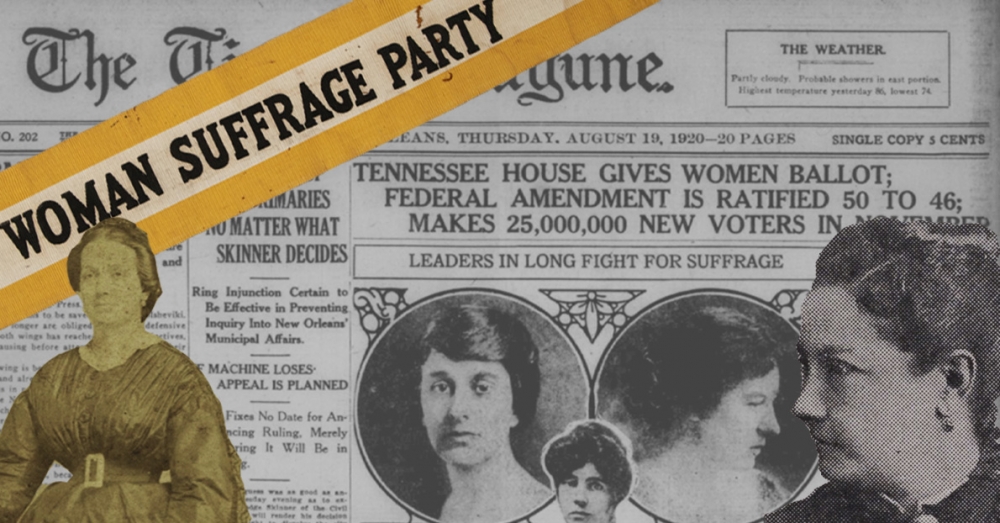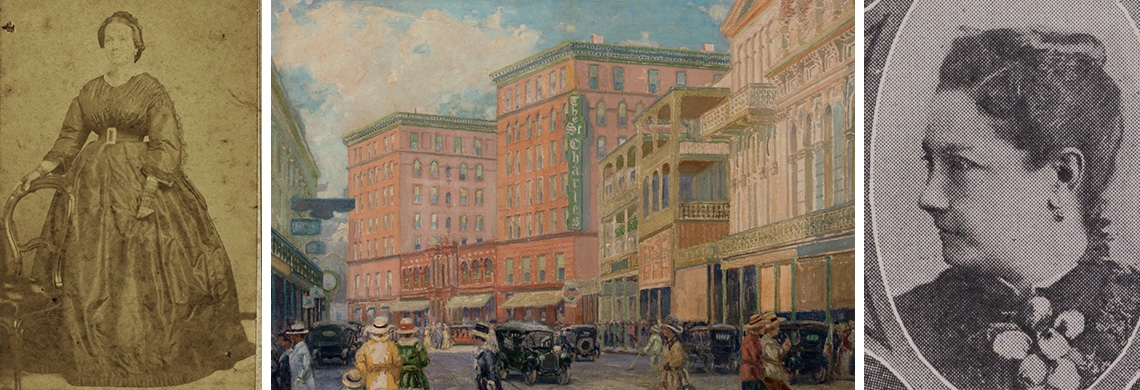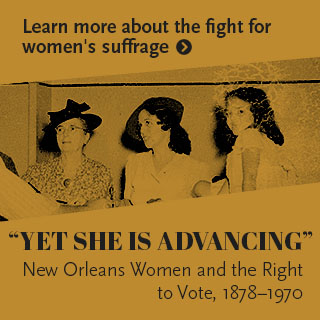XIX AMENDMENT:
The right of citizens of the United States to vote shall not be denied or abridged by the United States or by any State on account of sex.
Congress shall have power to enforce this article by appropriate legislation.
In the summer of 1920, after decades of fighting, the 19th Amendment to the US Constitution was officially ratified, removing sex as a basis of voting rights.
Amid the national celebration, The New Orleans Item proclaimed, “Suffrage—A Great Victory.” That same day, Ethel Hutson, longtime active member of the Woman Suffrage Party of Louisiana, put the triumph into context, calling it “the most important occasion for women in the history of the country. At last we are American citizens.”
Hutson’s exaltation was shared by many locally, including the thousands who had worked so hard for so long to achieve this basic democratic right; however, overall, reactions varied widely. Kate Gordon, a longtime leader of the local suffrage movement, met the news of the amendment with complete dismay, calling it, “a calamity.” These divergent responses illustrate the complexity of the issue. In New Orleans—and Louisiana more broadly—the question of who should have the franchise could not be separated from racial and sectional identity.
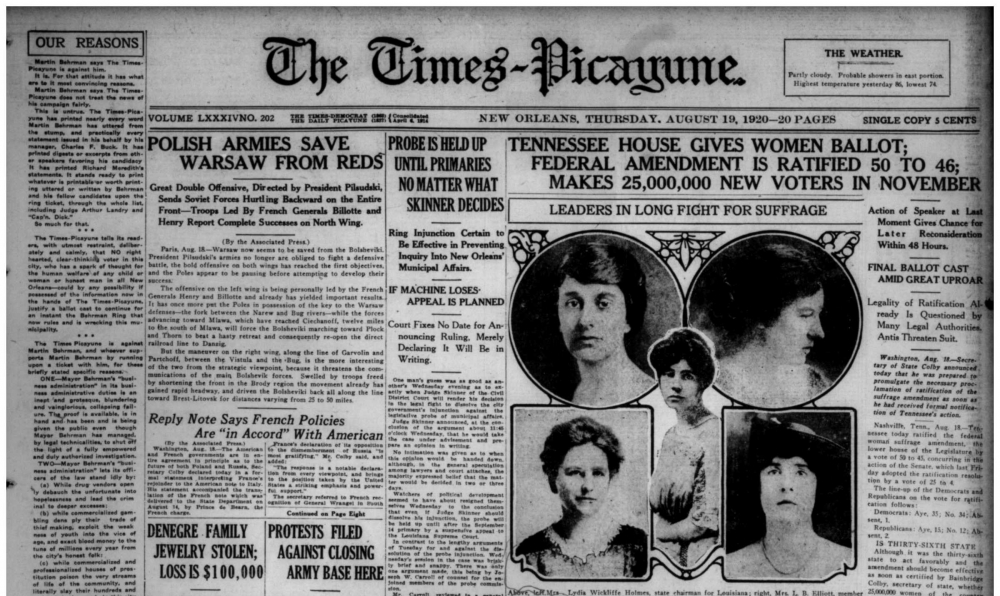
The front page of the Times-Picayune carried the news of women's suffrage on the day after the 19th Amendment was ratified to the US Constitution.
Nationally, the Seneca Falls Convention of 1848 is often considered the start of the organized women’s suffrage movement in the United States. The event was largely ignored by the New Orleans press, but it did not go completely unnoticed. One reader felt compelled to write in to the New Orleans Weekly Delta, saying, “I was rejoiced to see that our sex had at last thrown off the shackles which have bound us for centuries…The glorious achievements of both fore-fathers and fore-mothers will hereafter be celebrated by the American people; the former having relieved us from the British and the latter from the Male yoke.”
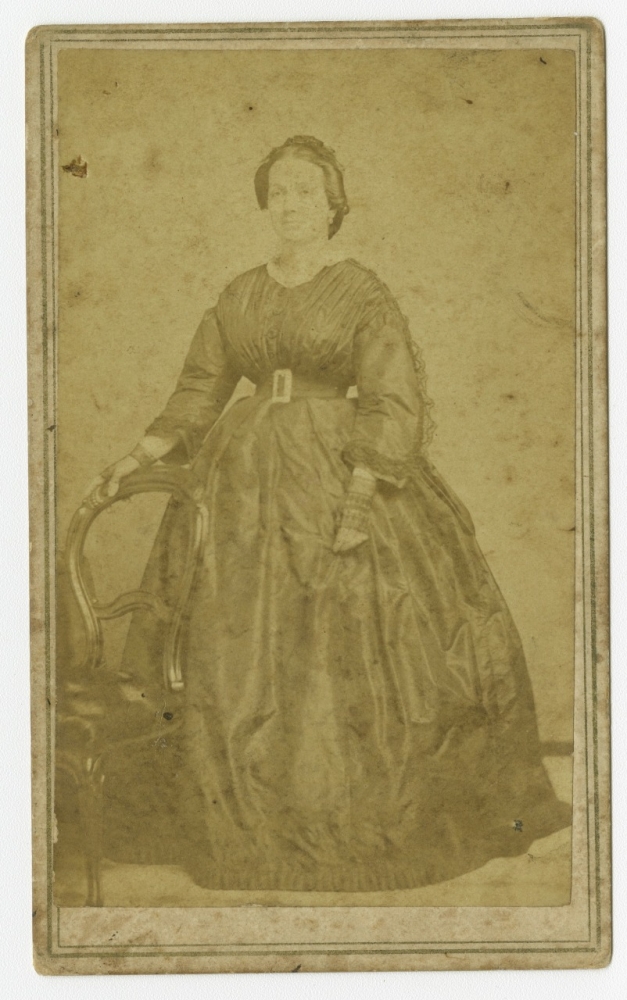
In New Orleans, the post-Reconstruction era saw the beginning of an organized push by women for the ballot led by Caroline Merrick (inset) and Elizabeth Lyle Saxon. Their work as suffragists began with an appeal before the Louisiana constitutional convention of 1879, where the suffrage committee agreed to hear remarks from Saxon and Merrick on the subject. According to the New Orleans Daily Picayune, Saxon “made one of the most able arguments in favor of woman’s suffrage that was ever made.” Unfortunately, though the women were personally well received, the convention did not seriously consider women’s suffrage.
Following the convention, Merrick’s work turned toward organizing. In the 1890s she helped form the Portia Club, then the Era club, which were both vital to pushing the movement forward in Louisiana.
The groups were, however, racially segregated, and it was during these years of Jim Crow that white supremacy was being written into the legal code across the South. After the Civil War, the 13th, 14th, and 15th Amendments, which were intended to protect the civil rights of black people—and specifically the recently emancipated—became key touchpoints for those arguing how best to enact women’s suffrage. In essence, the question was simple: was it the duty of the federal government to define and safeguard suffrage, or was it up to the states to determine who could vote?
In the South, this question cut to the core of the region’s identity. Many Louisianians feared that extending the vote via federal mandate, as the Reconstruction Amendments had attempted to do, endangered the white social and political control that had for so long defined life in the southern states. Some suffragists, such as Kate and Jean Gordon and Anne Pleasant (First Lady of Louisiana from 1916 to 1920), talked openly of the need to strategically consider how to extend the franchise exclusively to white women. For those in this camp, state amendments were the only acceptable path towards expanding suffrage to women.
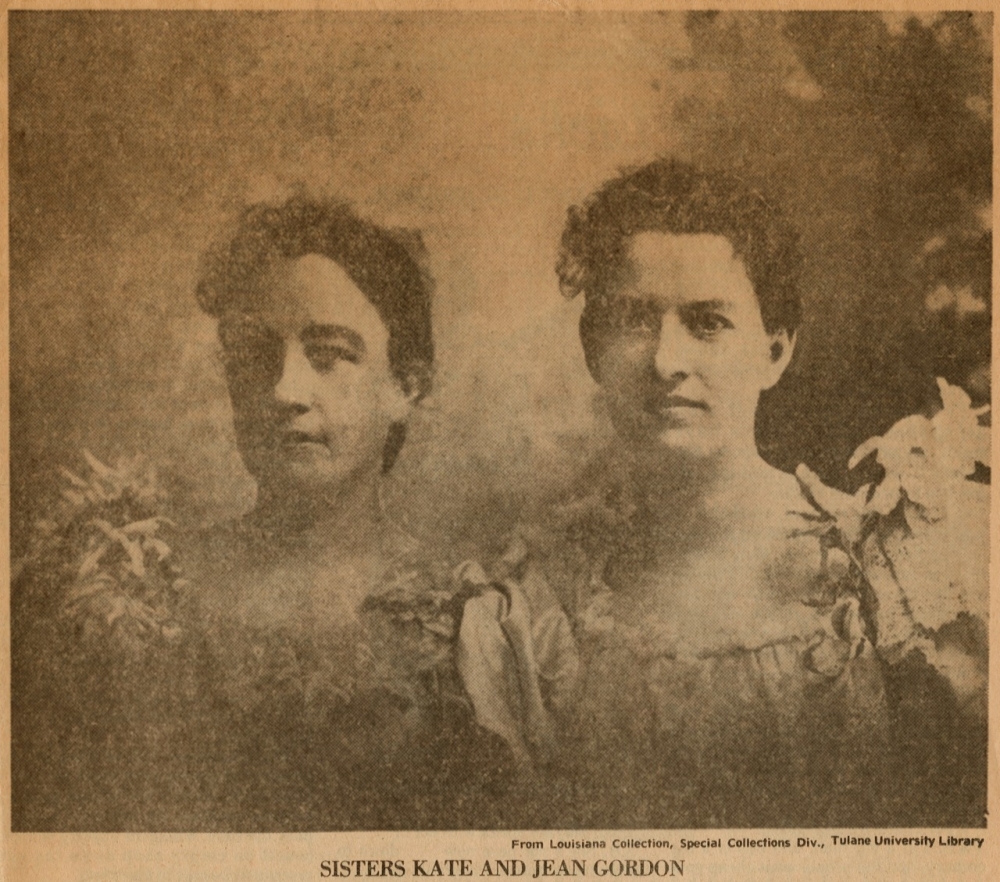
Sisters Kate and Jean Gordon fought for the right to vote for women, but their efforts were narrowed by their white supremacist viewpoint. As a result, they advocated a states' rights approach and fought against a federal amendment, fearing it would allow black women to vote alongside them. (THNOC, gift of Alexander Milne Home School for Girls, 97-44-L.6)
While women were beginning to agitate for suffrage, the state of Louisiana took steps during the 1898 constitutional convention to undo the gains African American men had made. The document that resulted from this meeting instituted a series of voting requirements to disenfranchise most African American men. The net result allowed Jim Crow policies to multiply and expand, becoming the norm across the South in the coming decades. Registration numbers before and after 1898 make the effects clear. By 1900 only 5,320 African American men remained registered to vote in Louisiana, a sharp decline from the approximately 130,000 registered in 1897.
Yet it was during this same convention that white Louisiana women finally made some headway in their fight for suffrage. Suffragists succeeded in promoting language in the constitution that would extend the vote to tax-paying women on issues related to taxation. Though limited, the extension was significant, not only in giving women a say in some local fiscal affairs, but also in exposing the hypocrisy of withholding suffrage and the damage done to democracy.
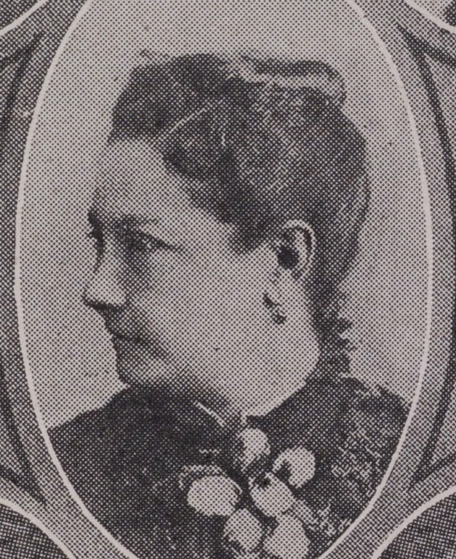
Though shut out from local white suffrage groups and chapters of national organizations, African American women worked alongside their peers for the right to vote, while facing much more severe hurdles and receiving little notice in the public record.
Local school principal and activist Sylvanie Williams (inset) served for years as a leader of the local Phyllis Wheatley Club, which, among other things, fought to uplift the lives and protect the rights of local African Americans and specifically African American women. Though not often recognized by their white peer organizations or the local press for their suffrage work, the Phyllis Wheatley Club was nevertheless instrumental in advocating for women’s voting rights.
In the spring of 1903, in part to recognize the gains for women voters made in the 1898 Louisiana constitution, the National American Woman Suffrage Association held its annual meeting in New Orleans. At the weeklong conference, held jointly at the St. Charles Hotel and the Athenaeum, Susan B. Anthony, Dorothy Dix, and other leading white advocates of women’s suffrage addressed the crowd. Though members of the Phyllis Wheatley Club were not invited to attend, the club was visited by a delegation of leading national suffragists, including Anthony and Dix, who introduced Williams as a local leader of utmost importance. At that time, Williams spoke poignantly of her group’s struggle amind the wider suffrage movement.
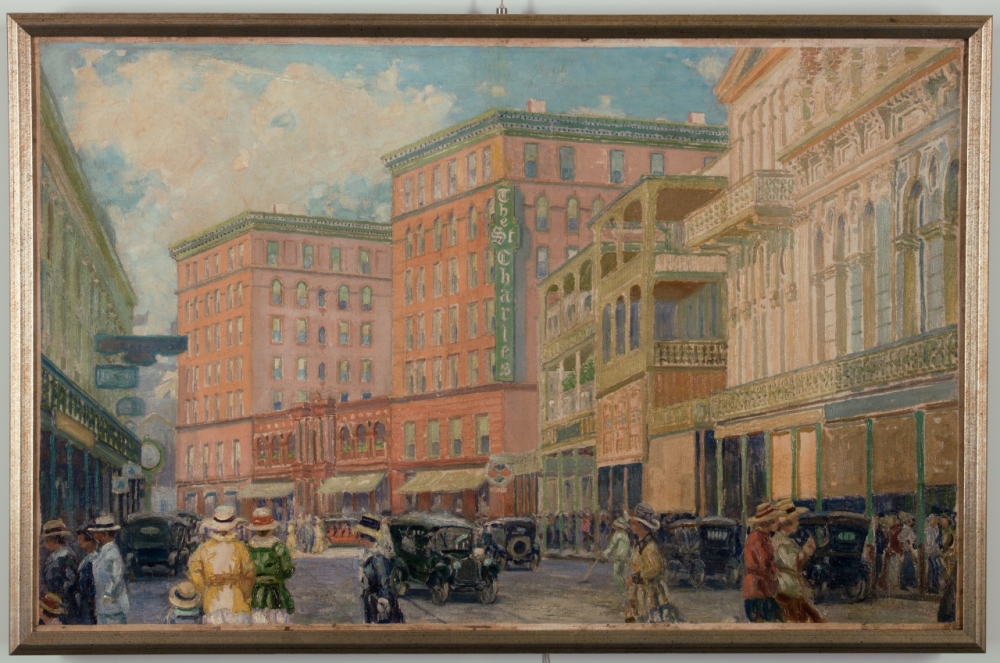
The St. Charles Hotel was among the most popular and opulent meeting places in New Orleans. It is depicted here in 1916, a little more than a decade after it hosted the National American Woman Suffrage Association's annual meeting. (THNOC, The L. Kemper and Leila Moore Williams Founders Collection, 1959.22)
“Flowers in their beauty and sweetness may represent the womanhood of the world,” Williams said. “Some flowers are fragile and delicate, some strong and hardy, some are carefully guarded and cherished, others are roughly treated and trodden under foot. These last are the colored women. They have a crown of thorns continually pressed upon their brow, yet they are advancing and sometimes further on than you would have expected.”
The question of racially based exclusion—from clubs and the franchise—was often brought to the floor at the whites-only meeting, deepening the existing divides.
Immediately following the convention, the National Council of Women (NCW), an umbrella group for women’s organizations, held its own national meeting in New Orleans. A diverse set of organizations comprised the NCW membership, including the National Association of Colored Women (NACW) and the National Council of Jewish Women. Each organization sent a representative to the NCW meeting. The president of the NACW chose Sylvanie Williams to serve as her proxy at the meeting, but when the Picayune announced her attendance a few weeks before the meeting, the all-white New Orleans Local Council of Women refused to attend if “colored delegates were to be present.”
Williams decided not to attend the NCW meeting. To make clear that a NACW representative should have been at the meeting, she wrote a letter to the council president requesting that the NACW’s report be read and acknowledged by the NCW. In the letter, which was published in the Woman’s Journal, Williams explained, “In justice to the 10,000 intelligent colored women comprising the National Association, I can do no less. My self-respect demands that I do no more.”
As women were gaining the right to vote in states across the country over the following years, the divides among suffrage groups grew starker. Many southern whites became more and more embittered by the idea of a federal amendment and the possibility of white women joining the electorate alongside their African American counterparts.
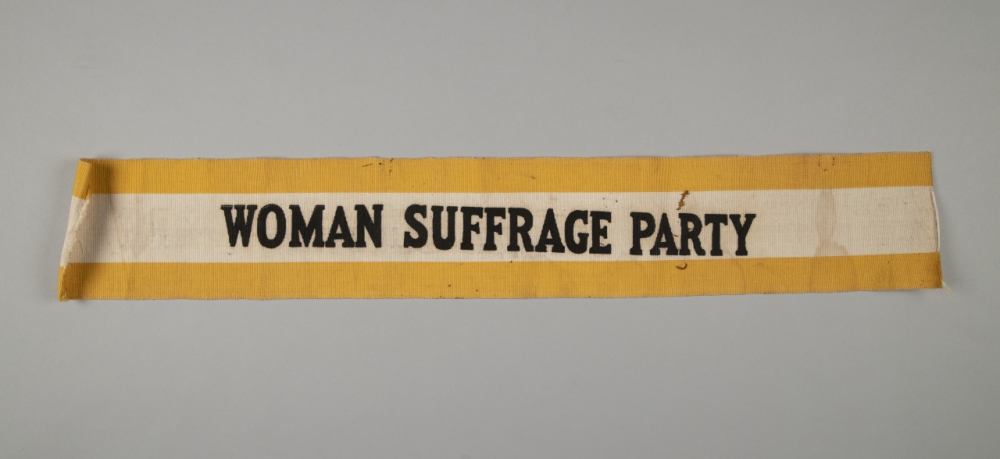 This sash was worn by Susan Walker Anding, a member of the Woman Suffrage Party of Louisiana. The WSP supported a federal amendment to secure women's suffrage and denouced the racially biased approach championed by the Gordon sisters. (THNOC, 96-47-L.9)
This sash was worn by Susan Walker Anding, a member of the Woman Suffrage Party of Louisiana. The WSP supported a federal amendment to secure women's suffrage and denouced the racially biased approach championed by the Gordon sisters. (THNOC, 96-47-L.9)
These issues irreparably fractured local suffrage associations, eventually resulting in the splintering of the Era Club. Suffrage leader Kate Gordon, an ardent and publicly avowed white supremacist, formed the Southern States Woman Suffrage Conference (SSWSC) in 1913, which promoted the passage of a state amendment. A separate group of women, led by Sake Meehan and Lydia Holmes, formed the Woman Suffrage Party of Louisiana and supported a federal amendment and denounced Gordon and others’ states’ rights approach, which was rooted in racism, according to historian Pamela Tyler.
In 1918, a House Woman Suffrage Committee was created in Congress to consider such an amendment. Meanwhile, the Louisiana legislature presented and passed a bill to extend the vote to the women of the state. To become law, the state amendment needed a simple majority in a public referendum. As the issue came before voters—exclusively male voters, as was the case with every women’s suffrage law passed—the New Orleans political machine, led by Mayor Martin Berhman, decided to put their muscle against it, quite likely becoming the deciding factor in its failure. In New Orleans the amendment to extend women’s suffrage via the state constitution lost by over 9,000 votes.
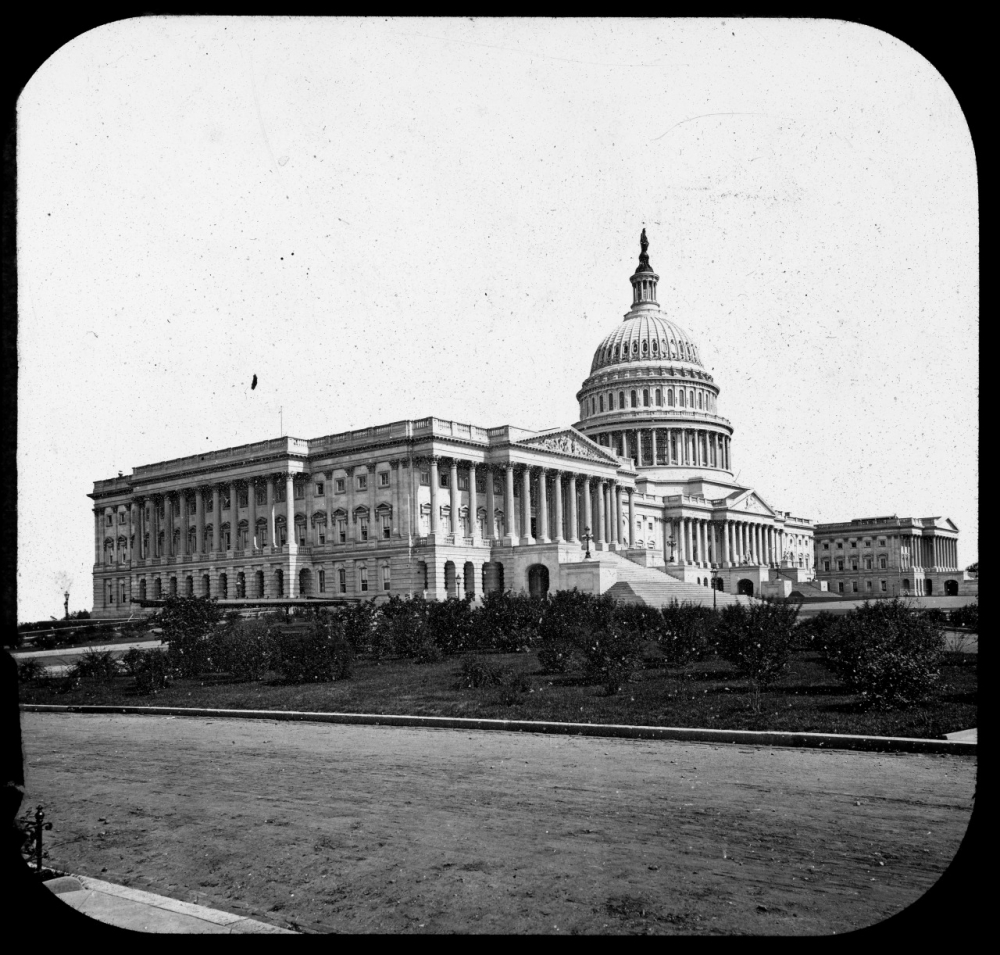 In 1918, a House Woman Suffrage Committee was created in Congress to consider an amendment giving women the right to vote. A failed effort toward a state amendment in Louisiana put suffrage in the hands of the federal process. (THNOC, gift of Mrs. Joy Segura, 2004.0096.96)
In 1918, a House Woman Suffrage Committee was created in Congress to consider an amendment giving women the right to vote. A failed effort toward a state amendment in Louisiana put suffrage in the hands of the federal process. (THNOC, gift of Mrs. Joy Segura, 2004.0096.96)
Following the loss, attention turned to the Susan B. Anthony amendment to the US Constitution, which was slowly moving through Congress. As the potential grew for a federal amendment allowing women of any race to vote, so too did the efforts of those for and against it. Leaders such as Hutson, Meehan, and Holmes rallied those in support. Meanwhile, Kate Gordon, buttressed by Louisiana First Lady Pleasant—and those opposed to women’s suffrage of any kind—campaigned ardently against it, continuing their cry for the furtherance of white supremacy in the South.
After Congress passed the 19th Amendment in 1919, a number of states—many of which had already enfranchised women in local elections—quickly ratified it.
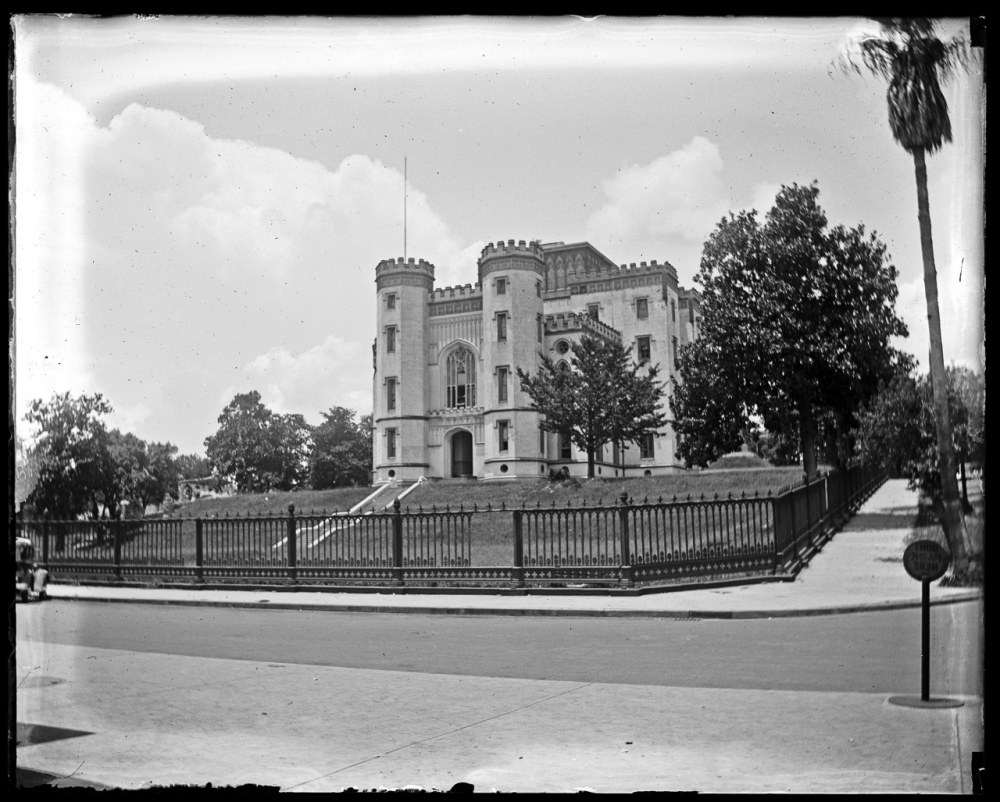
The old Lousiana State Capitol building is shown in 1932. In July of 1920, the Anthony Amendment came before the Louisiana Legislature, who voted against it. Tennessee was the 36th state to ratify the amendement in August, thus satisfying the necessary three-quarters requirement for federal ratification. (THNOC, gift of Waldemar S. Nelson, 2003.0182.371)
In July of 1920, the Anthony Amendment came before the Louisiana legislature, who voted against it. Yet despite significant antipathy in Louisiana, on August 18, 1920, Tennessee became the 36th state to ratify the amendment, thus satisfying the necessary three-quarters requirement for federal ratification.
The right to vote in the United States could no longer be denied based on sex.
Proudly, Lydia Holmes telegrammed her compatriots the message from Tennessee, where she was working for ratification, writing simply, “We win.”
Though Louisiana was slow to embrace women’s suffrage fully (the state only ceremonially ratified the 19th Amendment in 1970), the work done by local leaders and suffragists of all stripes made significant contributions, even as they fought each other to define which women would get the right to vote.
Sadly, the right of suffrage was not fully guaranteed for all women in 1920. Registration numbers in Orleans Parish and across Louisiana over the subsequent decade show the de facto result: white women could vote, but African American women still could not. In 1928, of the 115,456 women registered in Louisiana, only 320 were African American. It would take decades more fighting before the words of the 15th and 19th Amendments were fully protected and suffrage was extended across race and sex.
Honor Roll
Elizabeth Lyle Saxon, Caroline Merrick, and Sylvanie Williams were noteworthy for their contributions and represent the countless women who fought within and without suffrage organizations, formally and informally, for their rights. Other leaders such as publishers and writers Eliza Jane Nicholson and Elizabeth Merriweather Gilmer (a.k.a. Dorothy Dix) fought for human rights and dignity against the strictures of Victorian womanhood.
During the 1910s and ‘20s, Gilmer often spoke about Nicholson as a great leader, referring to her as a, “pioneer advocate for women’s rights,” (Time Picayune, 3/25/1903) while also trumpeting the invaluable work done by women every day, recognizing the labor – both physical and emotional – taken on, and often ignored, by so many. In the celebratory spirit of late August 1920, the Times-Picayune published a “Roll of Honor” highlighting a few women they felt merited recognition in the late days of the fight. These women deserve to be acknowledged again, as well as the many thousands more not named.
Mrs. James Thomson, Miss Kate Minor, Mrs. Joseph Devereux, Miss Agnes Morris, Mrs. Philip Werlein, Mrs. J. N. Van der Veer, Mrs. Reuben Chauvin, Mrs. Adolph Rocquet, Mesdames L. B. Elliot, Camilla Breazeale and Miss Elia Harral
